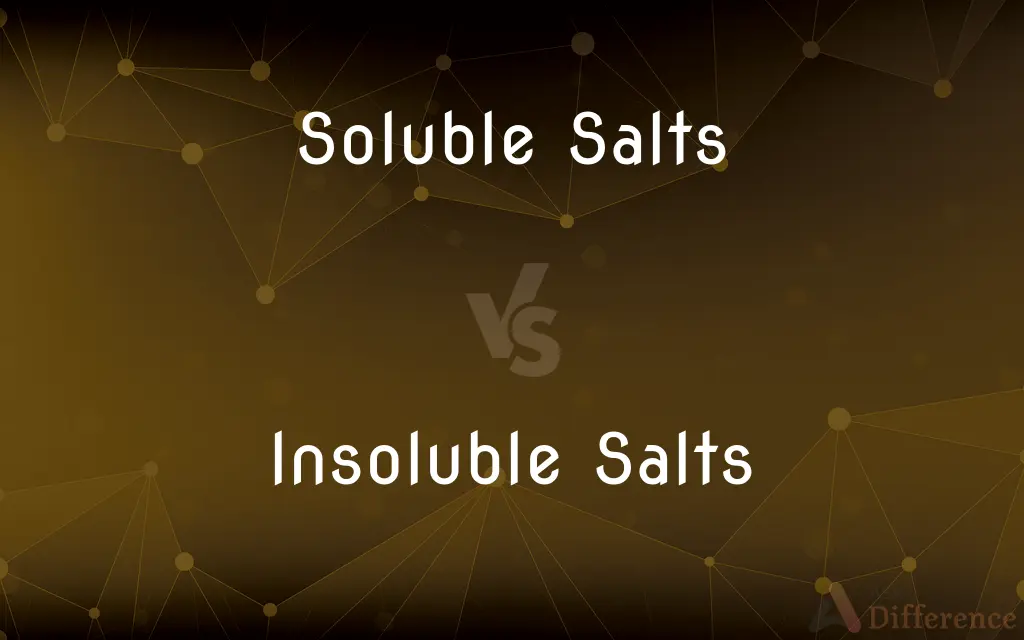Soluble Salts vs. Insoluble Salts — What's the Difference?
By Tayyaba Rehman — Published on November 21, 2023
Soluble salts dissolve in water, forming a solution, while insoluble salts do not dissolve and remain solid in water.

Difference Between Soluble Salts and Insoluble Salts
Table of Contents
ADVERTISEMENT
Key Differences
Soluble salts are compounds that readily dissolve in water to form a solution. When added to water, these salts break apart into their constituent ions, allowing them to mix uniformly with the water. On the other hand, insoluble salts remain undissolved when introduced to water. They either sink to the bottom or remain suspended in the water.
Soluble salts, when dissolved in water, usually produce a clear solution. This solution can conduct electricity because of the free-moving ions that the soluble salts release. Conversely, insoluble salts, when added to water, result in a cloudy or turbid mixture because of their inability to dissolve.
The solubility of salts, whether they are soluble salts or insoluble salts, depends on various factors. These factors include temperature, pressure, and the nature of the solvent (usually water). For soluble salts, an increase in temperature might increase solubility, while for some insoluble salts, a slight increase in solubility might be observed with rising temperatures.
Lastly, in practical applications, soluble salts find use in various industries where the properties of the dissolved ions are needed. Insoluble salts, due to their non-dissolving nature, find applications in areas like ceramics, paint pigments, or even in certain reactions where a solid precipitate is desired.
Comparison Chart
Dissolution in Water
Dissolve to form a solution.
Do not dissolve; remain solid.
ADVERTISEMENT
Appearance in Water
Produce a clear solution.
Result in a cloudy/turbid mixture.
Conductivity
Can conduct electricity.
Cannot conduct electricity.
Dependency on Factors
Solubility can change with factors.
Generally remain insoluble.
Practical Uses
Used where dissolved ions are needed.
Used where a solid form is desired.
Compare with Definitions
Soluble Salts
Salts that readily dissolve in solvents like water.
Adding table salt to water creates a solution of soluble salts.
Insoluble Salts
Salts that do not dissolve in solvents like water.
Adding chalk to water demonstrates the nature of insoluble salts.
Soluble Salts
Chemicals that, when dissolved, can conduct electricity.
Electrolysis often uses solutions made from soluble salts.
Insoluble Salts
Compounds that result in a cloudy or suspended mixture in water.
The turbidity in certain water sources might be due to insoluble salts.
Soluble Salts
Compounds that release ions freely in a solution.
Soluble salts in battery electrolytes facilitate the flow of current.
Insoluble Salts
Ionic compounds that remain solid when introduced to water.
Mixing certain chemicals might result in the formation of insoluble salts as precipitates.
Soluble Salts
Ionic compounds that break apart in water to form a clear solution.
Soluble salts in water produce an electrolyte solution.
Insoluble Salts
Chemicals that cannot form an electrolytic solution.
Insoluble salts won't facilitate electrolysis in an aqueous solution.
Soluble Salts
Materials that mix uniformly with water due to their dissolution.
Adding soluble salts to a pond might change its salinity.
Insoluble Salts
Materials that don't release ions in a solution.
Insoluble salts in a mixture can often be separated by filtration.
Common Curiosities
What are Soluble Salts?
Soluble salts are compounds that dissolve in water to form a clear solution.
What happens when Insoluble Salts are added to water?
They remain undissolved, often forming a cloudy mixture.
Why do Soluble Salts dissolve in water?
They have favorable interactions with water molecules, allowing them to dissolve.
Do Insoluble Salts conduct electricity in water?
No, since they don't dissolve and release ions, they can't conduct electricity in water.
Can the solubility of Soluble Salts change with temperature?
Yes, it can increase or decrease based on the specific salt and temperature.
Can Soluble Salts turn into Insoluble Salts?
In specific reactions, yes. Soluble salts can react to form insoluble precipitates.
What are Insoluble Salts?
Insoluble salts are compounds that do not dissolve in water and remain solid.
Can Soluble Salts conduct electricity?
Yes, when dissolved, soluble salts release ions that can conduct electricity.
Are all salts either Soluble Salts or Insoluble Salts?
No, some salts might have intermediate solubility.
What happens when Soluble Salts are added to water?
They dissolve and form a clear solution.
Why don't Insoluble Salts dissolve in water?
Their interactions with water aren't favorable, so they remain solid.
Are Insoluble Salts affected by temperature?
They might show slight solubility changes, but they largely remain insoluble.
Where are Soluble Salts used practically?
In industries like food, batteries, and wherever dissolved ions are beneficial.
How can one differentiate between Soluble Salts and Insoluble Salts in a mixture?
By adding water and observing. Soluble salts will dissolve, and insoluble salts will not.
Where are Insoluble Salts used?
In ceramics, paint pigments, and in reactions to produce a solid precipitate.
Share Your Discovery

Previous Comparison
Internal Validity vs. External Validity
Next Comparison
American Culture vs. British CultureAuthor Spotlight
Written by
Tayyaba RehmanTayyaba Rehman is a distinguished writer, currently serving as a primary contributor to askdifference.com. As a researcher in semantics and etymology, Tayyaba's passion for the complexity of languages and their distinctions has found a perfect home on the platform. Tayyaba delves into the intricacies of language, distinguishing between commonly confused words and phrases, thereby providing clarity for readers worldwide.
















































